Understanding the Power of Joy in Recovery
Recovery from addiction is a complex and deeply personal journey that extends beyond abstinence. Central to this process is the rediscovery of joy — a vital element that not only enhances emotional well-being but also significantly influences treatment outcomes. This article explores how finding joy can transform the recovery experience, fostering resilience, hope, and genuine happiness that sustains long-term sobriety.
The Role of Inner Happiness and Self-Acceptance in Recovery
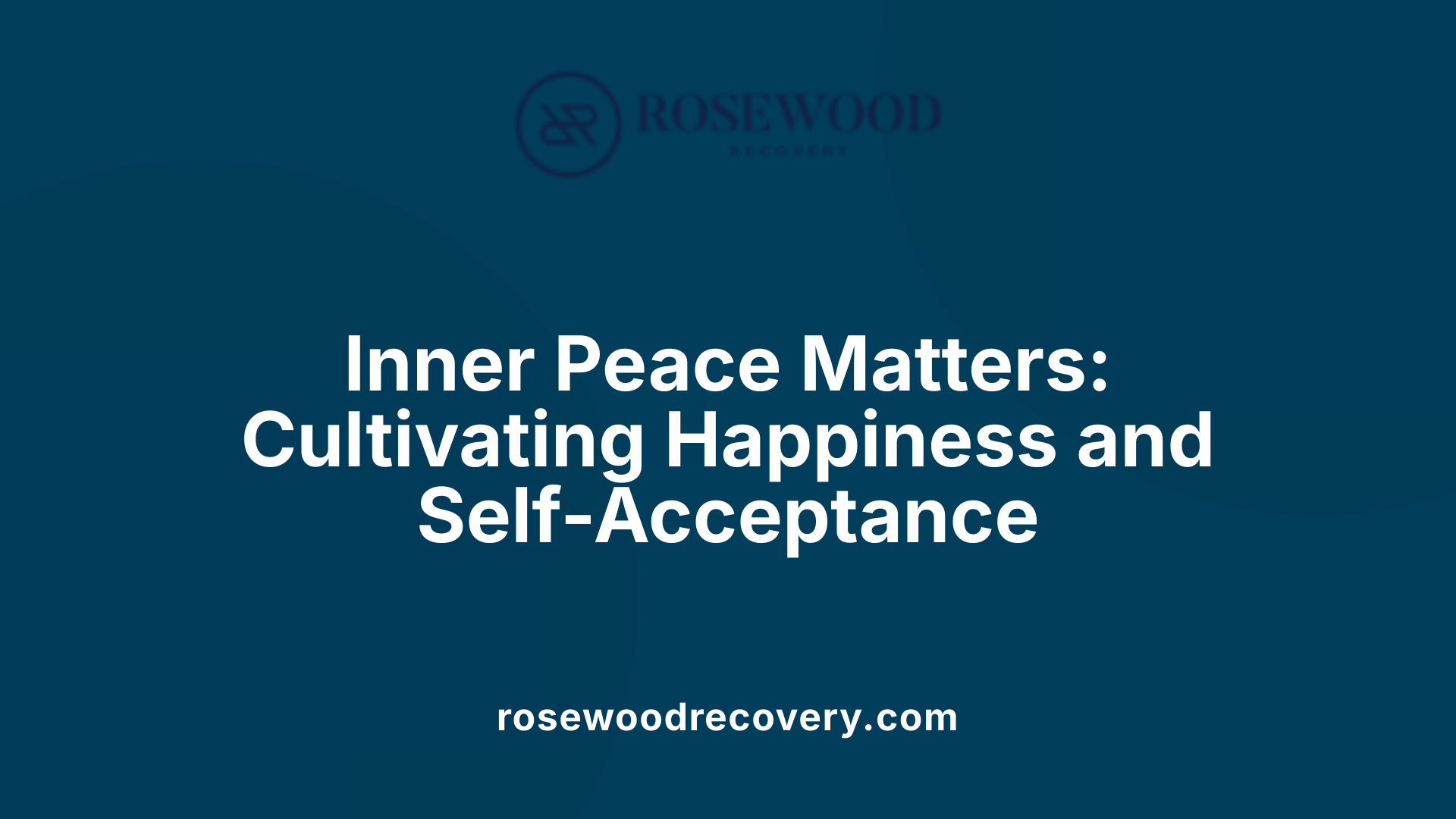
What is the most important thing in recovery?
In the journey of recovery, cultivating self-acceptance stands as a fundamental element. Accepting oneself without judgment helps build a stable foundation for healing and resilience. When individuals embrace their unique experiences and imperfections, they foster internal peace that supports long-term sobriety.
Rebuilding belief in oneself is equally vital. Chronic substance use can diminish self-confidence and self-esteem. Recovery involves restoring trust in one’s abilities and worth. Engaging in activities that reinforce personal strengths—like rediscovering hobbies or practicing gratitude—not only boosts confidence but also nurtures happiness from within.
Understanding that recovery is highly personalized allows individuals to define their own goals and milestones. Each person’s journey depends on their needs, desires, and life circumstances. Recognizing this helps tailor a path that aligns with personal values, ensuring a more meaningful and sustainable recovery.
A supportive environment plays a crucial role. Being surrounded by encouraging friends, family, or community groups—such as Alcoholics Anonymous or SMART Recovery—can reinforce positive changes. These communities provide understanding, shared experiences, and a sense of belonging, all of which enhance internal happiness and motivation.
Moreover, adopting holistic approaches, including mindfulness, gratitude, and self-reflection, contributes to inner well-being. These practices aid in managing negative emotions and fostering joy, which counteract the void that substances often filled.
Ultimately, recovery is about transforming your life. It encompasses reclaiming participation in community, establishing new passions, and maintaining mental wellness. Inner happiness and self-acceptance empower individuals to navigate setbacks and enjoy the process of healing, creating a life filled with purpose and genuine contentment.
Why Finding Joy Is Crucial for Successful Recovery
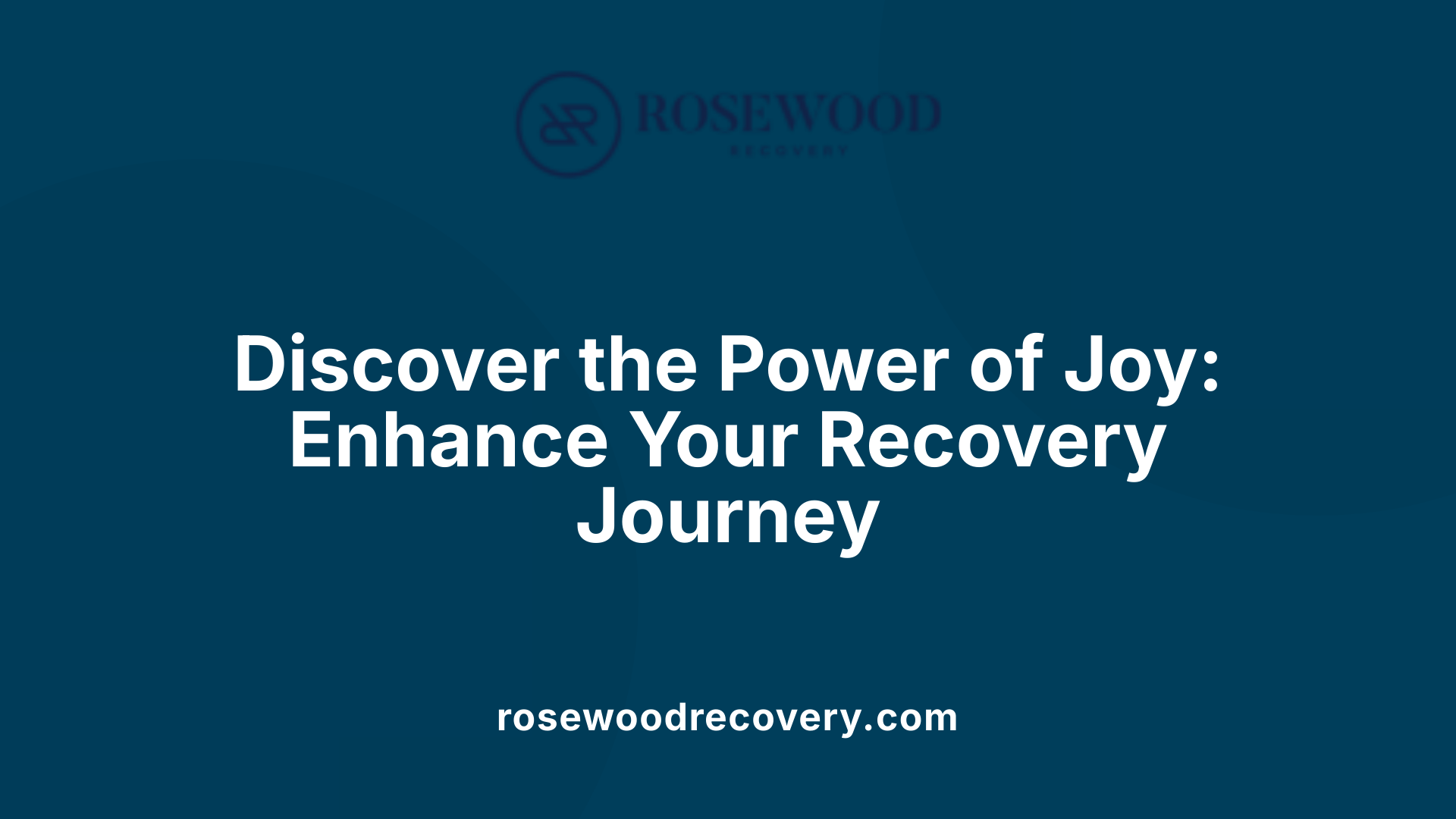
Why is finding joy important in recovery?
Discovering joy during recovery plays a vital role in shaping a successful path to lasting sobriety. When individuals experience moments of happiness, whether from enjoying a warm cup of coffee, sharing a child’s smile, or engaging in a hobby, it helps forge positive emotional responses that are crucial for healing.
Experiencing joy boosts resilience, which is essential for overcoming setbacks and challenges along the recovery journey. It transforms the recovery process from merely avoiding substance use to actively creating a fulfilling life filled with purpose. When people feel genuine happiness, they are more likely to maintain hope and motivation.
Several practices nurture this joyful outlook. Many find mindfulness and gratitude especially helpful—they encourage appreciating the present moment and acknowledging personal strengths like kindness, honesty, and gratitude. Celebrating small milestones, such as days sober or personal goals, reinforces progress and fosters confidence.
Living authentically means aligning daily actions with personal values and passions. Engaging in activities like trying new hobbies, building social support, and practicing physical activity stimulates positive emotions. These activities do more than fill unstructured time; they develop new skills, enhance self-esteem, and foster a sense of accomplishment.
Creating meaningful daily routines and recognizing personal growth help individuals feel connected and purposeful. Such efforts increase overall well-being, making the recovery experience more engaging and less isolating.
This overall approach encourages embracing a life filled with joy, purpose, and hope. It underpins the foundation of a resilient recovery, reducing the likelihood of relapse and supporting emotional health.
| Aspect | How it fosters joy | Additional Details |
|---|---|---|
| Building resilience | Through positive experiences, setbacks are seen as growth | Resilience strengthens the ability to withstand relapses |
| Reducing relapse risk | Joyful activities combat boredom and emotional triggers | Joy replaces substances as a source of happiness |
| Positive emotions and hope | Feelings of happiness cultivate a hopeful outlook | Hope drives motivation and persistence |
| Celebrating milestones | Recognizing progress enhances self-worth | Encourages ongoing commitment |
| Living authentically with confidence | Engagement in meaningful activities boosts self-esteem | Leads to a genuine, joyful life |
Focusing on happiness in recovery is more than a goal; it’s a vital component that influences mental, emotional, and physical health, paving the way for a resilient and enduring recovery.
Cultivating Positivity and Fun as Pillars of Sustained Sobriety
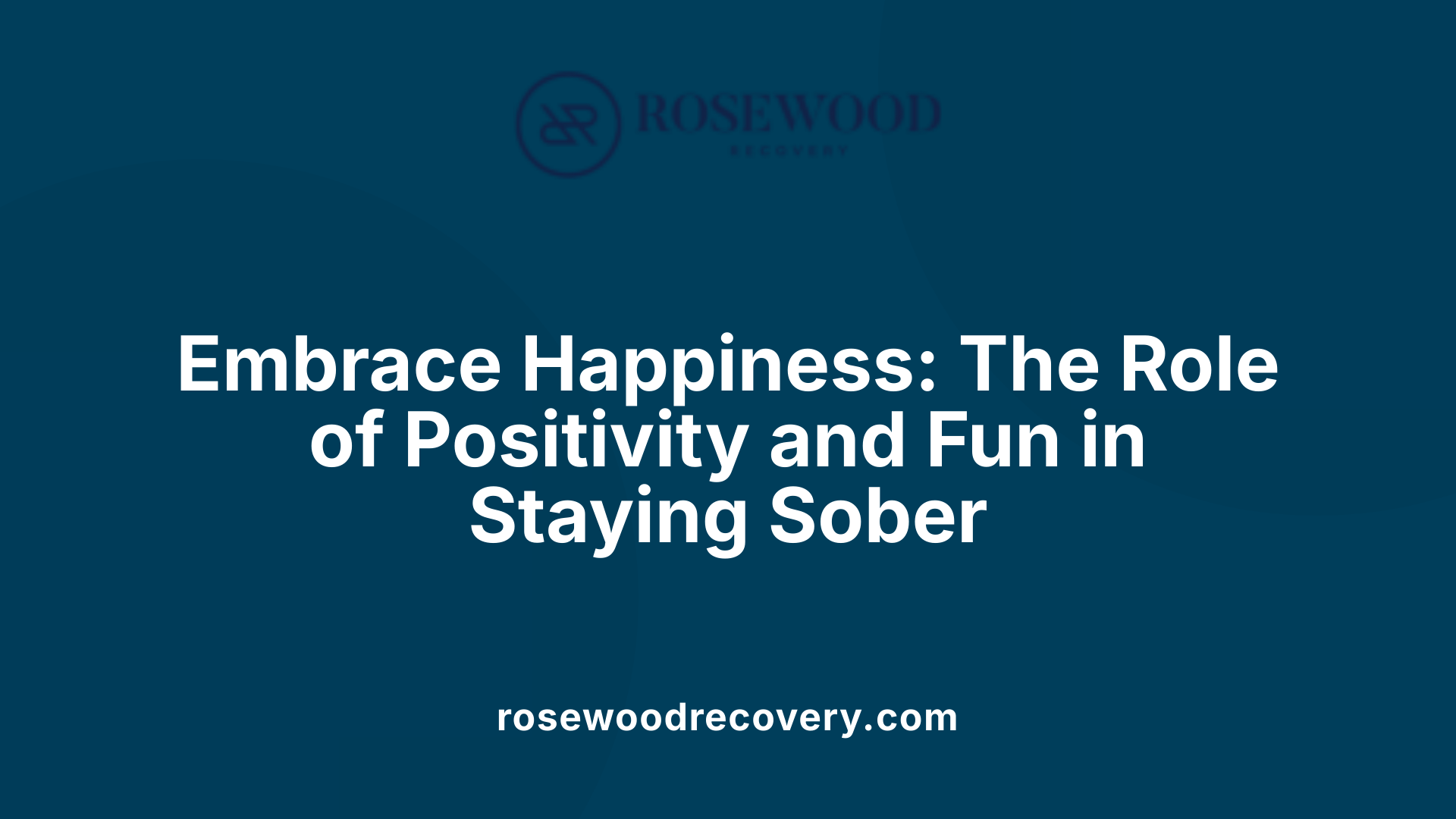
Why is positivity important in recovery?
Positivity plays a vital role in the journey of recovery by fostering resilience and empowering individuals to handle setbacks more effectively. When people focus on positive moments—such as enjoying a warm cup of coffee or a child's smile—they reinforce feelings of hope and motivation. Practicing gratitude shifts attention from what is lacking or difficult to what is abundant and good, nurturing a mindset of appreciation.
Psychologically, a positive outlook correlates with better mental health and physical well-being, supporting faster healing, a stronger immune system, and improved pain management. It also encourages setting realistic goals and maintaining perseverance, which are essential for long-term sobriety. Cultivating optimism and a growth mindset helps individuals view challenges as opportunities for personal development, rather than as insurmountable obstacles. Overall, maintaining positivity creates a supportive environment where recovery can thrive.
Why is it important to have fun in recovery?
Having fun during recovery is more than just leisure; it is a crucial aspect of emotional self-care that enhances overall well-being. Engaging in activities that bring joy—like hobbies, sports, or social outings—helps fulfill physical and emotional needs that substances might have previously satisfied. This shift not only reduces the risk of emotional relapse but also helps rebuild a positive association with sobriety.
Redefining fun in a sober context allows individuals to experience genuine happiness and create meaningful, lasting memories. Participating in outdoor adventures, community events, or creative pursuits fosters resilience, boosts self-esteem, and instills a sense of accomplishment. It creates a balanced lifestyle where recovery feels fulfilling rather than restrictive. By integrating enjoyable activities into daily routines, those in recovery can find motivation to stay sober and develop a rich, rewarding life.
How do positive activities and redefining fun benefit recovery?
Incorporating positive, enjoyable activities into everyday life contributes significantly to mental and emotional health. These activities help manage stress, reduce boredom, and fill unstructured time—factors that can trigger relapse. Participating in hobbies such as art, music, sports, or volunteering promotes neurochemical releases of dopamine and serotonin, which elevate mood and reinforce feelings of happiness.
Furthermore, engaging in fun activities builds social connections—an essential part of recovery support networks. Whether through sober events, hobby groups, or community outings, these interactions foster a sense of belonging and shared purpose. Redefining fun from substance-centered to activity-centered allows individuals to rediscover passion, purpose, and joy, which are foundational to a fulfilling sobriety journey.
Resilience and self-esteem in maintaining a joyful sobriety
Resilience and self-esteem are reinforced through meaningful activities and the cultivation of positivity. When individuals celebrate milestones, rediscover hobbies, or build supportive social networks, they affirm their progress and capabilities. These achievements bolster confidence, making it easier to face future challenges.
Practicing gratitude, staying connected with loved ones, and setting achievable goals foster a sense of accomplishment and purpose. Such efforts create a positive feedback loop: as resilience and self-esteem grow, so does the ability to maintain joy and motivation in recovery. Embracing a life filled with meaningful moments and fun supports long-term sobriety by nurturing a mindset where happiness is found within and shared with others.
| Aspect | Benefits | Examples |
|---|---|---|
| Positive mindsets | Increased motivation, better coping skills, improved mental health | Practicing gratitude, visualizing success |
| Enjoyable activities | Emotional well-being, reduced relapse risk | Hobbies, outdoor activities, social outings |
| Redefining fun | Genuine happiness, lasting memories | Creative arts, sports, volunteering |
| Resilience and self-esteem | Confidence, perseverance, goal achievement | Celebrating milestones, setting SMART goals |
By actively cultivating positivity and redefining fun, individuals in recovery can create a vibrant, joyful life that supports lasting sobriety and personal growth.
The Science of Joy: Neurochemical and Brain Conditioning in Recovery
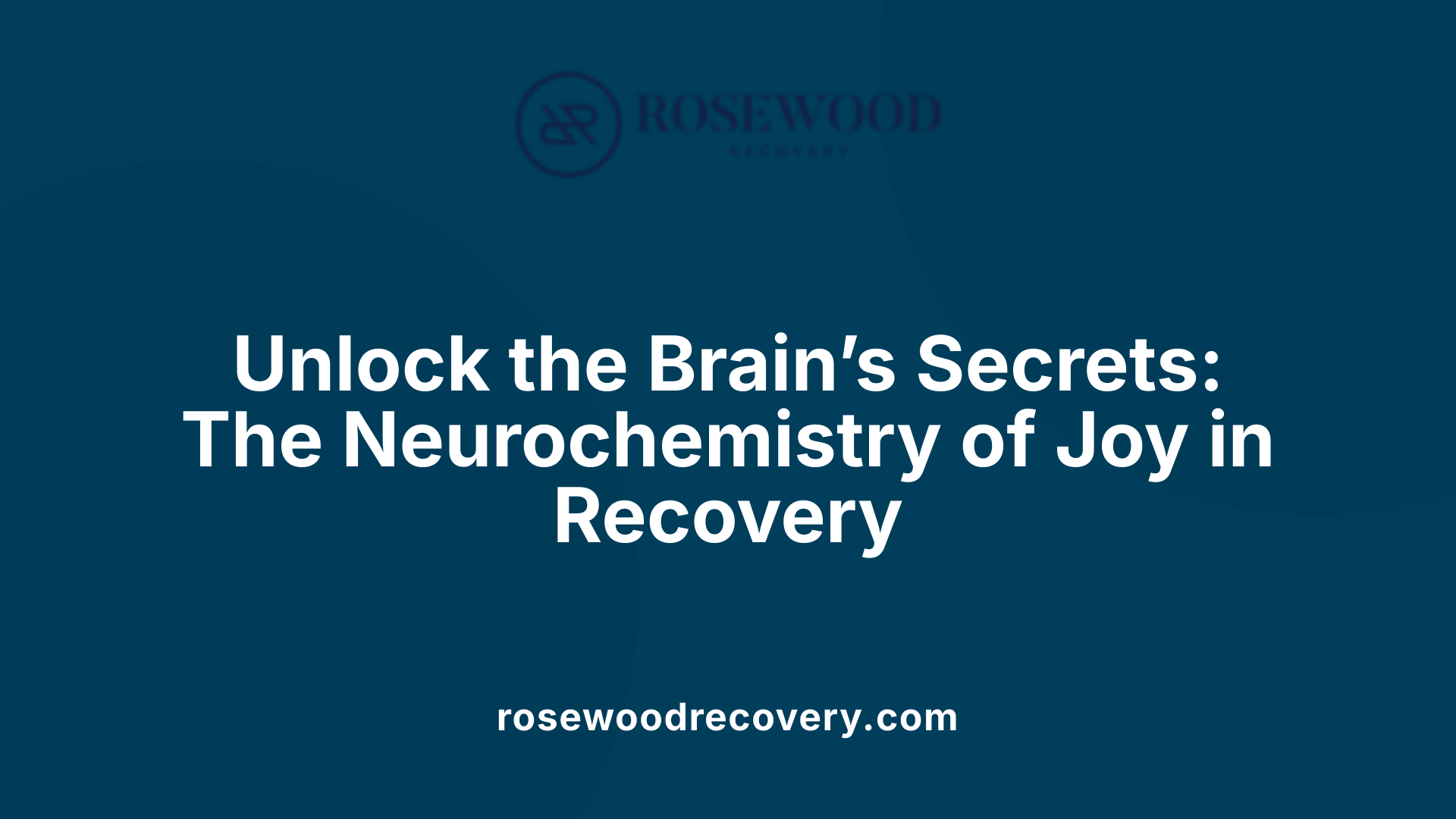
Neurochemicals involved in joy
In recovery, positive emotions are closely linked to neurochemicals like dopamine, serotonin, and endorphins. These chemicals are naturally released during pleasurable activities, helping to improve mood and reduce stress.
Brain structures affected by addiction
Addictive substances can alter brain areas responsible for motivation and pleasure, particularly the reward circuit. Chronic substance use floods the brain with dopamine, which can diminish the natural response to positive stimuli.
Conditioning of joyful responses
Recovery involves reconditioning the brain to experience joy naturally. Engaging in activities like mindfulness or hobbies helps reinforce joyful responses by stimulating prefrontal cortex areas associated with positive emotions.
Impact of positive stimuli
Experiencing nature, social connection, or engaging in hobbies triggers neurochemical releases that support recovery. These stimuli help reestablish the brain’s natural reward system, promoting feelings of happiness and resilience during sobriety.
Practical Strategies to Incorporate Joy into Daily Recovery Life
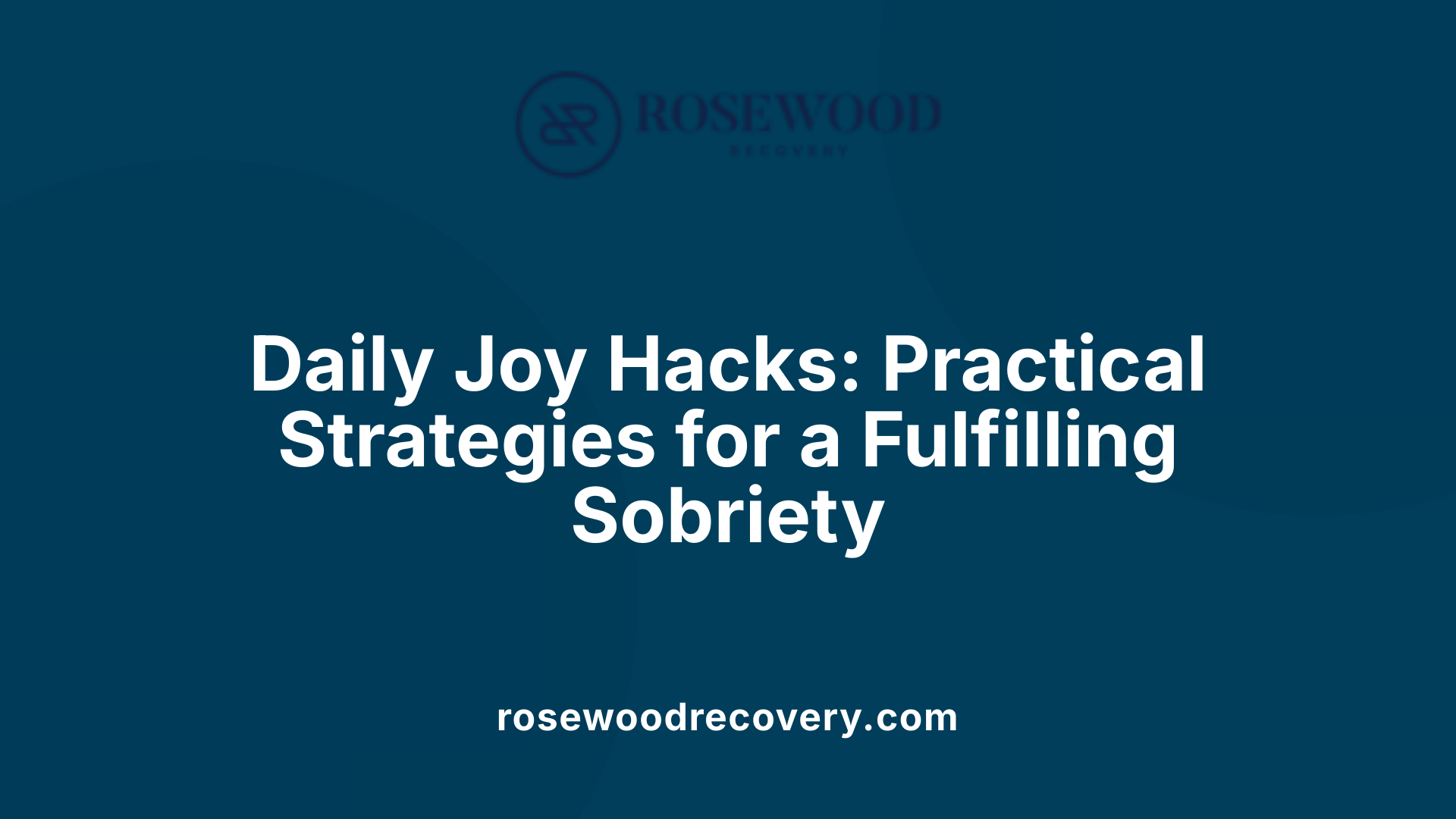
How can mindfulness and gratitude practices enhance recovery?
Practicing mindfulness and gratitude are powerful tools to help individuals find joy every day. Mindfulness involves paying close attention to the present moment, which can increase awareness and appreciation of simple pleasures like enjoying a warm cup of coffee or a child's smile. Gratitude exercises, such as keeping a gratitude journal, encourage focusing on positive aspects of life, building a resilient mindset amid challenges.
Why is celebrating milestones important?
Celebrating milestones, such as sobriety days, reinforces positive progress and encourages ongoing commitment. Recognizing these achievements creates a sense of accomplishment and purpose, boosting motivation. Sharing success stories with others in recovery communities helps foster a sense of belonging and support, further enriching the journey.
How do hobbies contribute to happiness during recovery?
Rediscovering hobbies or trying new activities helps fill unstructured time with meaningful engagement. Activities like learning an instrument, engaging in arts and crafts, or participating in sports boost self-esteem and foster a sense of achievement. Hobbies also serve as emotional outlets, manage stress, and develop new skills, making life more vibrant and fulfilling.
What role do social connections play?
Building a supportive social network is crucial in recovery. Engaging with friends, family, or community groups like AA or SMART Recovery offers social support and reduces feelings of isolation. Participating in sober group activities, such as movie nights or community projects, enhances social bonds and promotes a joyful recovery experience.
How does engaging in physical activity and connecting with nature help?
Incorporating physical activities like walking, hiking, or sports triggers the release of endorphins, natural mood enhancers that contribute to happiness. Spending time outdoors, enjoying sunsets or nature walks, helps reconnect individuals with their environment, reducing stress and fostering a sense of peace. These activities support mental health and make recovery more enjoyable.
| Strategy | Example Activities | Benefits | Additional Details |
|---|---|---|---|
| Mindfulness & Gratitude | Meditation, journaling gratitude | Increases awareness, positivity | Reprograms brain response to joy, reduces stress |
| Celebrate Progress | Sobriety milestones, sharing successes | Boosts motivation, sense of achievement | Builds community support |
| Rediscover Hobbies | Art, sports, learning instruments | Enhances self-esteem, reduces boredom | Develops new interests, emotional outlets |
| Social Engagement | Support groups, sober outings | Reduces isolation, fosters belonging | Builds support networks |
| Physical Activity & Nature | Hiking, outdoor walks, yoga | Releases endorphins, calms mind | Connects with environment, reduces stress |
Focusing on these practical strategies can help individuals in recovery experience daily joy, reinforce positive habits, and build a fulfilling, balanced life.
Embracing Joy as a Pathway to Lasting Recovery
Fostering genuine joy within the recovery journey is integral to overcoming addiction and achieving long-term fulfillment. By cultivating self-acceptance, celebrating progress, maintaining positivity, and engaging in meaningful, enjoyable activities, individuals can reprogram their brains to experience happiness naturally. This holistic approach not only supports emotional resilience but also enhances motivation, self-esteem, and community connection. Ultimately, rediscovering joy not only enriches the recovery experience but also paves the way for a vibrant, meaningful life beyond addiction.
References
- A 2024 Guide to Finding Everyday Joy in Recovery
- Finding Joy and Fun in Recovery
- Finding Joy in Sobriety: Fun Sober Activities
- How to Find Joy in Sobriety
- Recovery and the Neurology of Joy
- The Role of Hobbies in Building a Fulfilled Life
- Finding Happiness in Recovery
- How happy are you in your recovery? A novel predictor of ...




